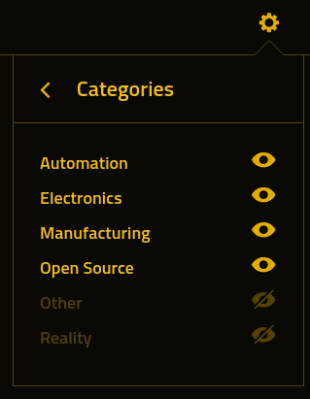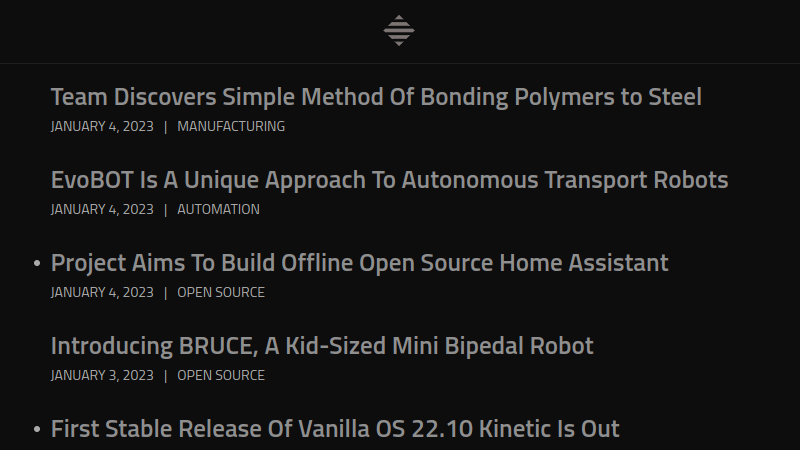There’s probably some axiom in professional journalism that says you shouldn’t give out free advertisement to your competitors — but since none of us have any formal training in this kind of thing and are just making it up as we go along — we’re more than happy to plug the brand-new MOSFET.net.

Created by the mysterious hacker [N-O-D-E], the site is exceptionally minimal, providing an experience not entirely unlike a feed reader. Each story has a main image, a few sentences that describe what it’s about, and the ever-important link to the original source. There’s even a color filter applied on the images so they aren’t jarring when compared to the site’s monochrome color scheme. (If that all sounds familiar, it’s because Hackaday came up with the idea 18 years ago. But it’s cool, we’re not salty or anything.)
In all seriousness, the site looks very well done and will no doubt be a great resource for the community. A particularly interesting feature is that entries expire automatically after 30 days. This speaks to the goal [N-O-D-E] has for MOSFET.net — it’s designed to show you relevant tech news, and literally nothing else. The focus and simplicity is beautiful.
Here’s wishing all the luck to [N-O-D-E] in this new venture. We know better than most that it can be a difficult and sometimes thankless job, but we wouldn’t still be doing it all these years if it wasn’t worth the effort. The tech world is always growing and there’s plenty of room for everyone. In fact, a recent peek at the analytics revealed that Hackaday got more views in 2022 than at any time in its history. As far as we’re concerned, the future looks bright for everyone.

















“A particularly interesting feature is that entries expire automatically after 30 days.”
One other feature I’ve been wondering about in the same vein is that articles would be hidden after you have read them. That might be of help if you’re someone who checks news sites every five minutes.
I really wanted to be snarky and write something like,
“Are his posts scattered with typos?”
Or
“Can comments be edited by their creator?”
But, I won’t
B^)
based on a cursory look at the site it looks like it fits this need at least partially with a spelling error on the page.
Or are “Venitlators” something new?
Better than HaD sometimes, although I’ve been reading for some time.
“A particularly interesting feature is that entries expire automatically after 30 days.”
Combined with the site breaking middle-click-new-tab functionality. it can go straight to the bin. If the site fails at basic functionality like “responds to mouse clicks” or “hyperlinks do not break at random” why on earth would it be worth anyone’s time to attempt to read?
Yeah. I often find hackaday articles and especially comment sections of decade old posts very useful.
Exactly! I have been a daily reader of HaD since Slashdot published a news piece about it going live back in 2004.
On a side note: Elliot, you *really* need to get a few writers to update the HaD wiki page.
It’s bad Wiki form to write your own page about yourself. We’d be stoked if folks in the community took that on!
[Elliot] I am sure you would not want me to do that for you!
B^)
yeah i was really turned off by the expiration as well. it doesn’t make sense to me. if you stumble onto something that’s really useful, maybe 6 months later you’ll be like “oh yeah! that’s just what i need! where did i read that?” and here this new site is actively stabbing you in the back in that common use case???
it’s not every day but i’ve definitely referred back to old articles on hackaday once or twice. it’s useful.
According to the article and a cursory look at the site it doesn’t look like they writing their own articles but just linking to articles around the web. So whatever it is your trying to refer back is still out there on whatever site it originates from. Do you really need to go back to the pointer to find it?
Right, the goal here seems more about discovery than actually adding anything to the conversation, so there’s really no need to keep the posts for long. For us, once a post hits the front page here we consider it part of the historical record (for better or for worse).
“Do you really need to go back to the pointer to find it?”
Yes. Human memory works by linking, so one of the ways I find an “I saw this article on [arbitrary topic that was not of much interest at the time but is important now] a few years ago, originally via website X, around date Y, between articles on Z and W” link is to follow that chain: go the the website I remember seeing it, jump through the archives to the date range, and look for the articles I remember it being near. Then I can find the link to the original article, and from there find the paper it was based on.
Killing off pages because you… want to save a few Kb of disk space? Means that sort of archive trawling becomes tedious using Arhcive.org, or near impossible for this website that lacks pagination.
Since the website is designed to be actively hostile to recollection, I’d rather just not bother giving it any memory space in the first place.
Remember how all the niche hobbies used to a have a forum? Those forums all seemed to migrate to facebook. Now all the useful stuff is buried under ads, search doesn’t work, the interface is hostile to doing work and privacy is a nightmare. You can’t even have different usernames for different forums, it’s all under yourr one master ID so facebook can sell more of your info.
This n-o-d-e thing seems like a good idea, but link rot is a bug, not a feature.
Recent HaD articles sometimes refer to even 10-year-old articles, and when i search for a specific hack with the search feature, I can discover it has already been done 20 years ago !
I may be missing something here, but is there a way to get to the actual article from the site? So far, it just expands to show a photo or video with no way to get to the original article.
There’s a link at the bottom of each article. 1 or 2 on each article.
Yes, i see that now. Thank you for pointing that out!
I like the aesthetic. But I’m not giving up on HackADay. I think the history of posting and the comments are important. I can google “rp2040 hackaday” and get a dozen excellent project examples AND more experienced people in the comments telling me how to improve it.
n-o-d-e, always leaves out the details that’s why i find it less than useful
It’s circular: they link back here to discuss Anya’s USB C connector article. lol
Mutual promotion!
I wonder if it will demand that my rssbot prove it is a human like all the cloudflare protected feeds…